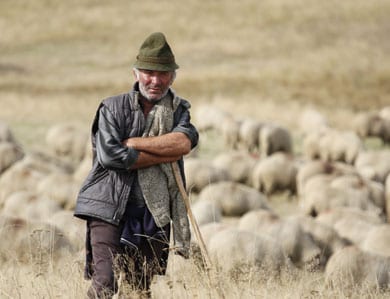 The desired of all nations (Haggai 2:7) has just been wiped clean of amniotic fluid. A proper birth announcement is in order. An angelic messenger, suffused in divine glory brings the news in knee-knocking fashion. The message culminates with a vast throng joining the angel to proclaim, “Glory to God in the highest, and on earth, peace to men on whom his favor rests” (Luke 2:14). A filmmaker’s fantasy. All manner of special effects employed. It comes with the flare and spectacle deserved of a king.
The desired of all nations (Haggai 2:7) has just been wiped clean of amniotic fluid. A proper birth announcement is in order. An angelic messenger, suffused in divine glory brings the news in knee-knocking fashion. The message culminates with a vast throng joining the angel to proclaim, “Glory to God in the highest, and on earth, peace to men on whom his favor rests” (Luke 2:14). A filmmaker’s fantasy. All manner of special effects employed. It comes with the flare and spectacle deserved of a king.
A regal announcement
All of this hoo-hah, bombastic and regal, is fitting the occasion. This, after all, is the long awaited Messiah. We would expect an announcement of this importance to be delivered in full spectacle. All should hear. It is a message of “good news of great joy that will be for all people” (Luke 2:10). An angelic choir seems the ideal delivery system. This is news that should be delivered far and wide.
Except it’s not. Delivered far and wide, that is. The surprise comes not in the delivery, but in the recipients. The message circumvents palaces and cities (both in close proximity) and comes instead to a band of ragtag shepherds in an open field outside an insignificant village in the middle of the night. An angelic misfire? A wrong turn for these celestial couriers?
Why shepherds?
Do we really need all this hoopla for shepherds? Certainly God could scale it down and still deliver the message effectively. One talking sheep would do for these bumpkins. Save the angelic hosts for the city of Jerusalem with a wider reach and more cultural leverage than these blue-collar grunts.
So why shepherds? There is reason that the birth of the Messiah is announced to these men in particular. The answer, in part, is that Jesus came from their ranks. He belonged to the Bethlehem shepherds guild. This had been determined long before his birth. Even with a carpenter from Nazareth as a father, his future as a shepherd from the rural backwoods of Bethlehem was certain. It had been predicted by the prophet Micah seven hundred years earlier.
In his most familiar prophecy, Micah pinpoints the Messiah’s origin as Bethlehem (Micah 5:2). But he also anticipates the Messiah’s vocation. “He will stand and shepherd his flock in the strength of the Lord” (Micah 5:4, NIV). A shepherd from Bethlehem. His fellow shepherds should be informed.
Bethlehem’s claim to fame
A shepherd is Bethlehem’s only claim to fame. In history, the town is rarely mentioned. But they did have one famous resident who began his career as a shepherd on these same hills. David, son of Jesse, had tended flocks in these fields. Long hours of attentive watchfulness over vulnerable sheep had prepared him to shepherd a nation. He became the great king of Israel. Micah recognized that the Messiah would take the same career path. The Messiah would be the great shepherd of the nation.
Jesus the Shepherd
Much is made of Jesus being a carpenter’s son, but he never refers to himself as a wood worker. Jesus came as a shepherd. And while we don’t know that he ever owned a flock of sheep, he does identify himself with the shepherd’s union. So, in Matthew 26:31, he applies Zechariah 13:7 to himself, “I will strike the shepherd and the sheep will be scattered” (NIV). The striking of the shepherd is the crucifixion; the scattering of the sheep is the ensuing cowardice of the disciples. Even more direct is John 10:11, where Jesus calls himself the good shepherd who lays down his life for his sheep.
This is a flock, not of four legged wooly creatures, but of two legged men and women. We, the susceptible ewes, foolish and shortsighted, herd-driven and reckless, convinced that the grass is always greener in the field just over the fence. He, the wise shepherd, alert to danger, aware of the needs of his flock, sacrificing comfort and ease for the goodwill of his sheep. He beckons. His sheep know his voice and follow.
Christmas is a subtle invitation to find pasturage under his gentle rod and staff; to graze peacefully as the shepherd wards off dangers; and to trust him for provision even in scarcity. He knows how to make us lie down in green pastures and lead us beside still waters. For he fills the manger long after he outgrows swaddled cloth. This is the good news of great joy that will be for all people. And a shepherd would understand that most of all.
Phil Huber is a freelance writer. He blogs regularly at www.aploddingpilgrimage.blogspot.com

Comments